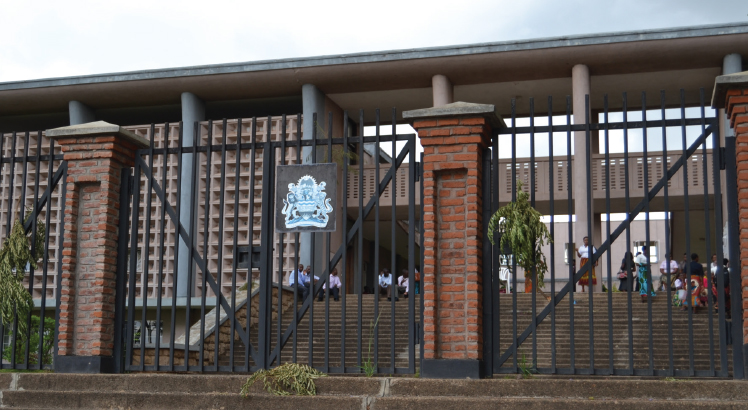Anti-judge vibe worries judiciary
The Judiciary has accused the National Assembly of acting contrary to its own Standing Orders which restrict legislators from questioning the conduct of a judge without a specific charge and debating a matter that is yet to be concluded in court.
Last Thursday, the House spent almost the whole day debating a motion which questioned a court ruling in favour of Master Borehole Drilling Company against Gam Oil Limited.
But in a written response, registrar of the High Court and Malawi Supreme Court of Appeal Kondwani Banda said the manner in which the debate was conducted in the House sets a dangerous precedence.
Citing parliamentary Standing Order 99 (1), the registrar said the conduct of the Speaker of Parliament, ministers, members, judges, resident magistrate, and public officers shall not be called into question in the course of debate, except by way of substantive motion containing a specific charge which, in this case, was not the case.

Observed Banda: “The purposes of this Standing Order is to ensure that in the conduct of their debates under the parliamentary privilege, members do not act unfairly. It essentially depicts the very principle courts use, never condemn before hearing.
“Considering the nature of the debate that went on, to an extent the members did not tread carefully on this thin line. And in a way acting unfairly as the motion that was brought did not contain a substantive charge and further no opportunity to defend oneself was given.”
He further stated that if examined soberly, this matter has set a dangerous precedence because it affects protection of judicial officers and public officers in the conduct of their duties based on the cited Standing Order.
Banda added that the same Standing Orders (192) also restricts the House from debating a matter that is still live in court.
“And so, all we implore is that the members must be guided by their own rules as departure from the same does not reflect well on the overall picture of how business is conducted in the House,” he said.
Commenting on the matter, Catholic University head of law faculty John Gift Mwakhwawa said the Constitution allows Parliament to impeach judges, and therefore, this would mean that the House has powers to question the conduct of any judge while following proper procedure.
The legal expert also agreed with the registrar’s observation that the House can debate a judge’s decision, but not necessarily their conduct without according them the right to be heard.
Said Mwakhwawa: “When you begin to discuss the conduct of a judge, you must always give the other side a chance to be heard. With regard to discussing the judgement, there is no problem because it is in black and white before you and, therefore, you do not have to hear their side which is already on paper, but when you start discussing the conduct of the person, you must apply rules of natural justice.”
He further hinted that while the rule of thumb has it that you do not comment on matters that are in court, there ought to be a lawful exception, especially where things have completely gone wrong. However, he said he was not sure if the case in question qualifies for that exception.
On his part, private-practice lawyer Justin Dzonzi observed that Parliament has a supervisory mandate over the conduct of judges as the Constitution empowers legislators to impeach them.
He, too, argued that if Parliament can fire judges, it essentially means they have powers to assess judges’ conduct, which does not infringe on the concept of separation of powers.
Said Dzonzi: “Separation of powers means that Parliament must not sit down and judge cases. It does not mean that Parliament must not hold the Judiciary accountable. There is a difference. So, when Parliament says we are not happy with this or that, they are not taking over judicial functions but they are simply holding the Judiciary accountable.”
He said for a long time, there has been a wrong understanding of judicial independence to mean that the courts are beyond reproach.
But a judge, who spoke on condition of anonymity, said while judicial officers are supposed to be accountable for their decisions, attacking personality is strictly outside accountability and must be cured.
The judge said he finds the behaviour of some members of Parliament (MPs) as an act of intimidation and probably a syndicate to silence their perceived opponents in the Judiciary, further fearing that some may use this unprocedural conduct to fight back judges just for their own selfish reasons.
Said the judge: “If they have issues with the judge, let them follow procedure. Impeachment requires that there must be a complaint registered. Did anyone complain that the judge is corrupt or these are just assumptions?
“This case was started with one judge who passed it on to another judge before it went to the Supreme Court where the application was not also successful. Why singling out one judge? It is easy to make these image-tarnishing innuendos, but if MPs have evidence of corruption, they know where to report to.”
Meanwhile, some civil society organisations have asked Parliament to withdraw its motion to have the Legal Affairs Committee investigate the said judge and judgement on account of judicial independence.
While Parliament has not responded to our questionnaire, the leadership of the House on Thursday last week was reluctant to have the motion tabled for fear of overstepping their mandate. However, on the insistence of members, being private members’ day, the motion was carried.





